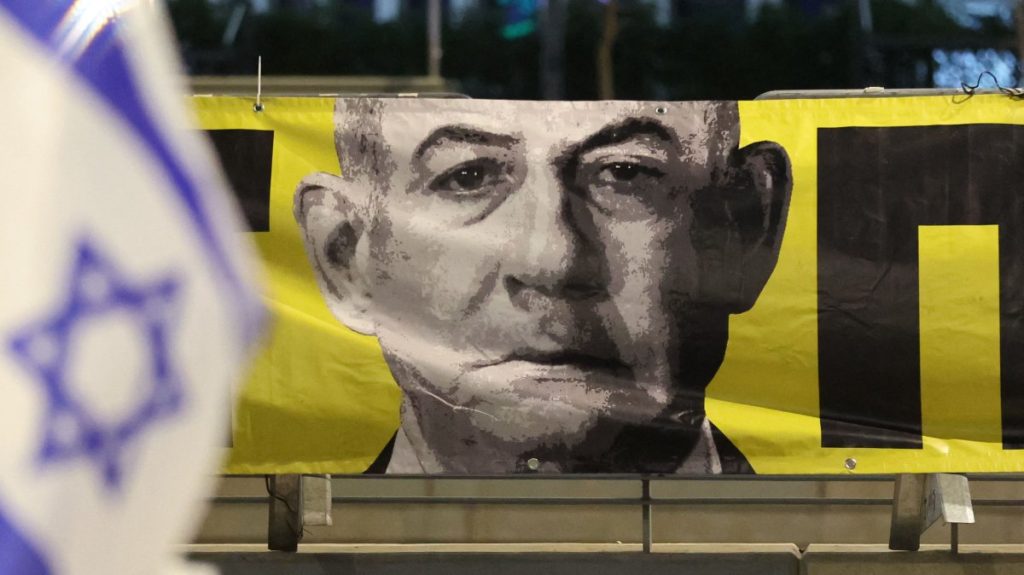The name of Benjamin Netanyahu, Israel’s genocidal and child-murdering prime minister, has been associated with a new crisis in recent days. Netanyahu, who is being prosecuted for corruption and for whom the International Criminal Court (ICC) has issued an arrest warrant for war crimes and crimes against humanity committed in Gaza, is now facing a serious accusation of treason for not taking the necessary measures despite knowing in advance about the Oct. 7 attack.
In fact, Netanyahu’s role in the events of Oct. 7 has been debated in Israeli public opinion before. It was argued at the time that the fact that Hamas killed all 1,200 people who allegedly died on Oct. 7 was inconsistent with the available evidence, and that none of the weapons in Hamas’ possession were effective enough to have such an impact. The Hareetz newspaper even went a step further and revealed from the testimonies of soldiers on duty that day and eyewitnesses in the area that the order for Hanibal Directive was given and that the Israeli army, which was dispatched to the area, killed its own soldiers and citizens in order to prevent them from falling into the hands of Hamas. In other words, Netanyahu is not only responsible for the massacre of tens of thousands of Palestinians, but also for the killing of his own soldiers.
How did crisis surface?
However, the latest incident is of a different nature than the previous allegations. Based on the investigation conducted by Shin Bet, Israel’s domestic intelligence agency, and dubbed “Qatargate,” there are serious allegations that Netanyahu and his office were aware of the attacks on Oct. 7 but did not report it to the security services, that the money sent by Qatar to Hamas to pay the salaries of civil servants in Gaza was transmitted through Netanyahu’s advisers, and that some of this money was embezzled.
The revelation of the Shin Bet’s investigation into Netanyahu and his advisers is a scandal. On Oct. 7, after the chief of the military intelligence organization Aman and the chief of staff resigned due to their failures, Netanyahu demanded the resignation of Ronen Bar, the chief of the Shin Bet. However, Bar refrained from resigning, saying that they had been conducting an investigation against Netanyahu for a long time and that it would not be appropriate for him to resign at this stage.
This is where the crisis started. Netanyahu stated in his statement that he no longer trusted Shin Bet chief Bar and, therefore, did not want to work with him, and that if Bar did not resign, he would dismiss him. Moreover, according to Israeli legislation, the prime minister has the authority to dismiss the Shin Bet chief.
However, upon Bar’s objection, the attorney general’s office responded that the prime minister had the authority to dismiss the Shin Bet chief, but that the extraordinary sensitivity of the circumstances and the unprecedented nature of the matter, as well as the concern that the dismissal would be tainted by illegality and conflict of interest and perhaps most importantly, that the Shin Bet chief’s position was not a position of personal trust serving the prime minister, and that the lack of trust alleged by the prime minister was not sufficient to warrant dismissal.
It has also been reported that in order to initiate the impeachment process, the prime minister must first obtain a favorable opinion from the attorney general’s office. Then, if the legal advisory board decides that the grounds presented by the prime minister are sufficient for impeachment, the prime minister may exercise his authority. In fact, in a meeting with Netanyahu, Attorney General Gali Baharav-Miara even informed him in person that it would not be appropriate to dismiss him because of his conflict of interest with the Shin Bet.
However, Netanyahu turned a deaf ear to all these warnings and announced that he had dismissed Bar with the support of his government partners. Following this development, Shin Bet chief Bar appealed to the Supreme Court, requesting a stay of execution. Upon the request, the Supreme Court agreed with the attorney general and ruled that the prime minister could not dismiss Bar under the current circumstances.
Nevertheless, Netanyahu ignored the decision of the attorney general and the Supreme Court, saying that he would not work with Bar again, that Bar should leave his post and that he should immediately end the investigation against him.
Plunging Israel into civil war
Netanyahu’s insistence on dismissing Bar despite the adverse rulings of both the Attorney General’s Office and the Supreme Court was interpreted as declaring war on Israel’s democracy and institutions, and Netanyahu was accused of dragging Israel into a civil war for his personal gain.
While a section of Israeli society was already upset with Netanyahu for ending the cease-fire in Gaza and endangering the lives of 24 of the 59 hostages held by Hamas, who are believed to be still alive, this was compounded by his decision to dismiss the Shin Bet chief, who was known to be investigating him, despite the opposing views of the Attorney General’s Office and the Supreme Court. As a result, over 200,000 people demonstrated in Tel Aviv last weekend, protesting against Netanyahu and demanding his immediate resignation.
The opposition also joined the criticism of Netanyahu, especially the main opposition leader Yair Lapid, who said in a speech that Netanyahu’s confrontation with the institutions of the state was harming Israel and that it was the end of the road for Netanyahu, calling on all institutions to go on strike and the public to engage in civil disobedience against the government in order to force Netanyahu to resign, just like the protests against the judicial reform two years ago.
Ehud Olmert, one of the former prime ministers of Israel, stated that “the biggest enemy for Israel is neither Hamas nor Iran, the real enemy of Israel is Netanyahu, who clashes with the army and intelligence and weakens the state.” He also said that if Netanyahu does not resign, the country will rapidly move toward a civil war.
In fact, Netanyahu’s struggle against the institutions and functioning of the state is not limited to trying to remove the Shin Bet chief. On the other hand, the justice minister also leads the process of changing the composition of the committee that selects judges for the Supreme Court. According to the draft bill prepared by the justice minister, they are trying to change the composition of the judicial selection committee, which currently favors the opposition, in favor of the government, in order to ensure that the judges of their choice are elected to the Supreme Court.
However, if Netanyahu insists on such a change, the country will be thrown into turmoil, and the country, which is already in a state of war, will be plunged into a major crisis quickly.

Economic repercussions
In addition to the political crisis, a major economic crisis is also likely. While all credit rating agencies have warned that the Israeli economy is contracting due to the ongoing Gaza attacks, Moody’s downgraded Israel’s credit rating by two notches last September, from A to Baa1. Citing “the declining quality of Israel’s institutions and governance to manage state finances” and “increased spending needs during wartime” as reasons for the downgrade, Moody’s downgraded Israel’s credit outlook to negative, saying that not only the end of the cease-fire in Gaza but also other political crises created by Netanyahu pose very high political risks that weaken Israel’s economic and fiscal strength.
Similarly, S&P and Fitch have also signaled in their statements that Israel’s very high exposure to geopolitical risks, the existence of a polarized political system that puts pressure on governance and policy effectiveness and tensions in society could lead to another downgrade.
Netanyahu’s various political maneuvers to stay in office are putting further strain on an economy that has already been worn down by a year and a half of war. Although there is no talk of a collapse of the Israeli economy yet, there is no optimistic expectation that the war will end anytime soon, and with the possibility of it spreading to Lebanon, Syria and even Iran becoming more likely, the economy could be driven into bankruptcy.
As a result, Netanyahu’s attempt to dismiss the chief of Shin Bet, the domestic intelligence agency that is investigating him, and his desire to change the composition of the judicial selection committee that determines the judges to be elected to the Supreme Court, which takes advantage of the war situation in the country, are likely to trigger political fault lines in the country and drag Israel toward a civil war on the one hand, and lead to the collapse of the economy on the other.
Therefore, it has become essential for the people of Israel to make a decision on this issue. Either they will continue with this corrupt and genocidal Netanyahu, who has a warrant for his arrest for war crimes and will be ostracized by the international community and become a pariah state, or they will stand up for their country and get rid of Netanyahu as soon as possible.


